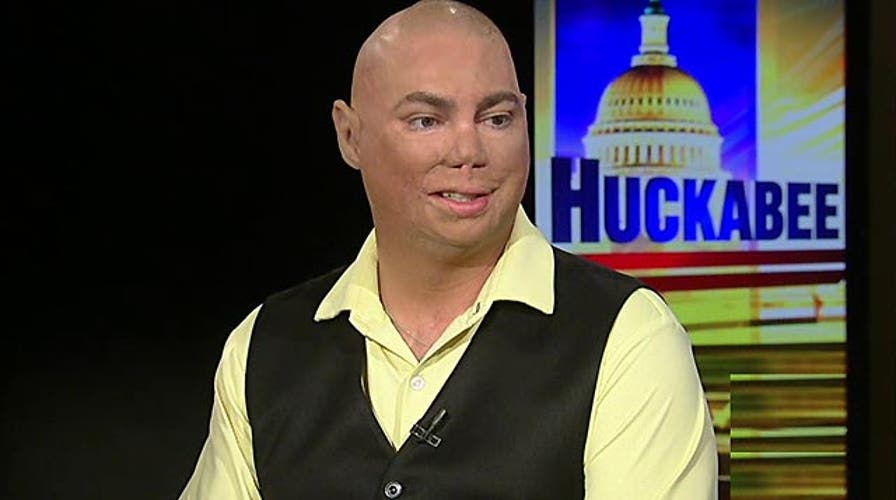I enlisted in the U.S. Army after 9/11.
On my second deployment, in 2007, I sustained catastrophic burn injuries when my vehicle struck an IED, which left me as a patient in the burn unit of Brooke Army Medical Center for three long years. I retired from the military in 2010 and began motivational speaking shortly thereafter. I became a franchise owner in 2012.
The book I wrote was published this month, meaning I can officially add “author” to my resume. [pullquote]
I have been very fortunate in many ways. I shouldn’t have survived the IED blast that took the lives of three of my best friends, but I did. My survival story opened up doors that otherwise may not have opened—to become a motivational speaker, a franchisee, and now an author.
Unfortunately, many of my fellow veterans have not been blessed with the same opportunities that I have.
The latest numbers from the U.S. Department of Labor show that the jobless rate for veterans has edged down to 6.6 percent. While that number is lower than it could be, that means there were still 722,000 unemployed veterans in 2013.
Veterans often have a hard time returning to the job market, and I believe the cause for that is twofold. Many times, veterans do not know how to position their skills and expertise for the job to which they are applying, and often times employers assume that veterans lack the education and qualities necessary to perform the job in question.
I would say to both: veterans are the most qualified job applicants out there.
Unfortunately, not all veterans believe they’re qualified or know how to translate their military service to the career they are applying for.
Some of my buddies joke that when they fill out applications or work on their resume, they say things like “can tote guns” or “can detain bad guys.” They talk about how well they can shoot or how far they can walk while wearing a 60+ pound backpack. While those are certainly skills they possess (and impressive in their own right), including them on a resume likely contributes to a potential employers’ dismissal of their application.
The part that many of these men and women fail to translate is that they’ve had thousands upon thousands of dollars spent on their professional development. Leadership courses are encouraged in the military and often built into the common core training that service members go through weekly, and in most cases daily.
Service members are taught core values that are not just good in the military, but in life. The Army values are loyalty, duty, respect, selfless service, honor, integrity, and personal courage. The acronym is LDRSHIP.
Service members are pushed to their limits in basic training and purged of bad habits, then built back with core values, leadership training, and specific knowledge of their particular military occupational specialty (MOS). It's not just a crash course, but hundreds of hours of hands-on training.
Even as young recruits, service members are trusted with thousands of dollars worth of equipment. As a junior service member, I was responsible for over a million dollars worth of machinery. I was trusted with secret information. I was trained to be a leader from day one. I was a better man after basic and MOS training, and I was 27-years-old when I came in.
Imagine a young man or woman spending their first few years after high school, heavily invested in with all this training. Basically they are managers, team leaders, business owners, or supervisors just in need of an opportunity. Veterans are leaders. They are sharp, trustworthy, hard-working individuals.
Along with direct and indirect core training, specialty and leadership training, we are taught to adapt to our environment and to make critical decisions in the worst of conditions. Some of those decisions are life or death, and need to be made under fire, heat, dehydration, bleeding, and worse. That kind of high-pressure critical thinking and decision-making cannot be learned anywhere else, or found in the average job applicant.
There is a stereotype that some people join the military because they have nowhere else to go. That is the farthest from the truth, yet another reason veteran applicants may be turned away.
Many of the men and women I have served with have college degrees—bachelors, masters, and doctorates. Some of them were completed prior to the military and some were obtained while on active duty. Both require a great deal of dedication and discipline.
Our days on duty are rarely a 9-to-5-type job. A typical day is 12 to 13 hours. It is not uncommon for days to run together with little or no sleep, for many of us to be up for 48 hours straight. Veterans will work until the job is done. They will give it their all. They will not complain.
Veterans, as we celebrated Labor Day earlier this week, many of you were thankful to have a job, and many of you were hoping, wishing and waiting for a job.
I encourage you to hold your heads high and know that you are deserving of an opportunity. You are qualified. You will do an excellent job. You have proven yourself to your previous employer, and I know that given the chance, you’ll do the same for your next.
Business owners, hiring managers, human resource departments—thank you. Thank you for hiring veterans, thank you for giving us a chance. Thank you for the role you’ve played in putting more Americans back to work.
As you take a look at the many applicants for your open position, I hope that you’ll look at the veteran with 5, 10, 20 years of military service in a different light. If he or she was willing to take a bullet for his previous employer, imagine how hard they’d be willing to work for you.

